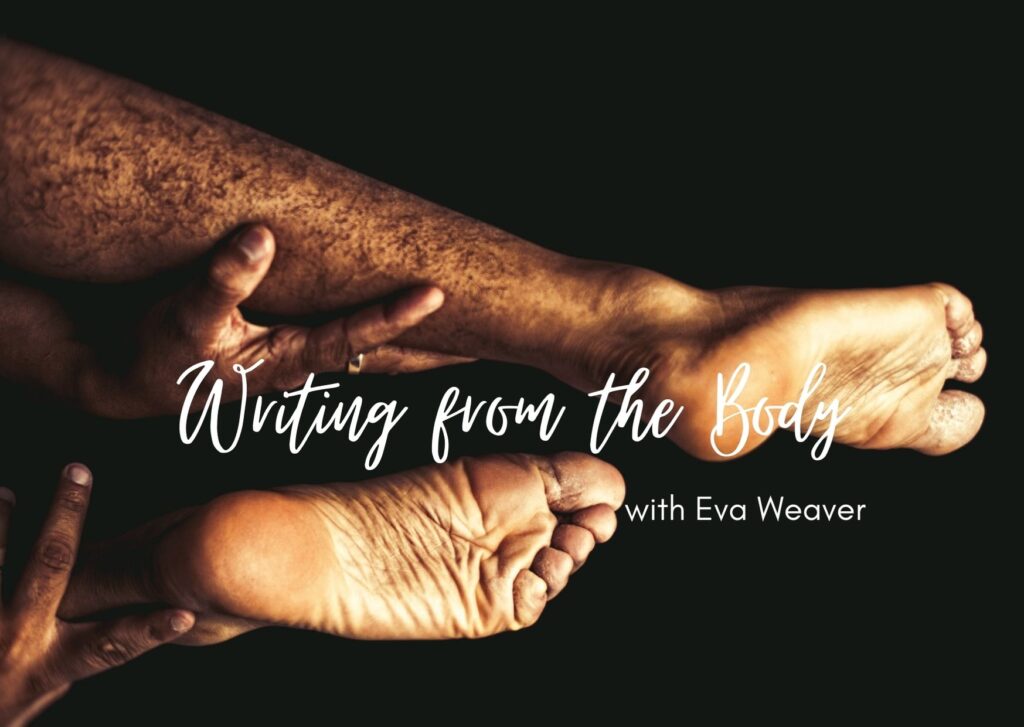
Many people experience a disconnect between the head and the rest of their body.
Writers also are not primarily known for their state of embodiment. Indeed, many writers seem to be fine to walk through life with their bodies as a vehicle for the mind- precious in that way, but not to be tapped into more deeply.
There are of course many reasons for such disconnection, including physical and mental trauma, dysphoria, body shame etc. But if we manage to connect with the body in a compassionate way, we can tap into the huge reservoir of resources, stories, ideas, strength & resilience that the body truly holds. Julia Cameron writes about the body-writing connection in ‘the Artist’s Way’:
‘We store memories in our bodies. We store passion and heartache. We store joy, moments of transcendent peace. If we are to access these, if we are to move into them and through them, we must enter our bodies to do so.‘
So, how can engaging with our bodies and writing from the body support us as writers?
1. LEARNING TO SETTLE & FEEL GROUNDED
In writing from the body, we begin each session with a simple exercise in ‘grounding’.
By connecting with our feet, skeletal system, gravity, back and breathing consciously, we become calm and connected with the environment around us and within. We might feel our feet on the ground, our sit-bones, notice how gravity holds us, lean back and into what supports us, feel the length and agility of our spine and drop into our physical existence.
All of this helps us to arrive in the present moment and is a powerful antidote to the voice of procrastination, of not feeling good enough or imposter syndrome that has us ask ‘who am I to write?’
We all have a right to write, like we have a right to breathe and walk this earth.
Writing from the body, we begin by noticing what is present, and being curious about our bodies, and from that place, about our writing.
2. NERVOUS SYSTEM AWARENESS TO HELP WITH ANXIETY & CHALLENGES THAT COME WITH A CREATIVE LIFE
One aspect of writing from the body is to become aware and educated about our nervous system. We learn about our habitual patterns, how we meet the varied challenges of the writing life, such as anxiety about creating new material, completing or showing work, writer’s block etc. and learn tools to deal with anxiety- to soothe and self-regulate the nervous system. Such regulation happens with and through the body, such as through grounding exercises, slow breathing or a technique such as heart-math breathing. Understanding how we react to stress- flight, fight, freeze or appease/faun responses, and the ability to self-regulate, creates resilience and an invaluable foundation for a regular creative writing practice. From here we are able to write no matter what else is going on in life- something that creativity coach Eric Maisel calls ‘creating in the middle of things.’
3. WORKING WITH THE BODY TO CREATE A REGULAR WRITING PRACTICE
Combining a physical practice such as yoga, stretching or dancing with writing, can be very useful in setting up a daily writing practice. Many people who would like to write but feel blocked in some ways, manage to have a regular movement or embodiment practice such as yoga. Moving straight from one to the other, say from yoga to writing, avoids long engaging with critical voices and helps not only to write, but tap into deeper and more embodied writing. As with any form of physical exercise, a little goes a long way. In Writing from the body, we break writing down into small, doable steps and create in short, concentrated bursts, and so bypass procrastination or overwhelm.
4. GET MOVING! MOVING EMOTIONS AND CREATING FLOW
By moving our bodies in different ways- gently or with large, expansive movements, dancing, shaking, stretching etc- we can move blocks and obstacles, shake out difficult emotions, shift stagnant energy and create space for inspiration and flow. Moving, we connect with the totality of our bodies, actually begin to FEEL our bodies, so that they are not just vehicles to get around with, or hold our brains and minds, but so we can feel and cherish our bodies and experience ourselves as embodied beings. Writing done from an embodied source has usually a different quality: a more embodied, deeper, richer one. Of course there are many reasons why we might be resistant to feeling more embodied or connect deeper with the body. For many it has not felt safe to live in a body or the body has been a source of pain or trauma.
Writing from the body can support the process of befriending the body and cultivating self-compassion by taking small doable steps. And doing a little regularly (movement, conscious breathing, grounding etc) can go a long way.
5. BREATHWORK FOR INSPIRATION, CLEARING & HEALING
By consciously breathing and through processes such as ‘conscious connected breath’, ‘rebirthing breathwork’, we can clear and dissolve obstacles, including past trauma, and bring spaciousness and clarity into our lives and to our writing. The word ‘inspiration’ comes from breath- literally to inhale, to take in breath/spirit. I have experienced in myself and with many clients how breathwork can be a phenomenal source of inspiration: plot-twists, solutions to structure & characters and new ideas for projects might come to us. We can breathe fresh life into routines and enliven writing that has become shallow, cliched or stale.
6. LISTENING TO THE STORIES OF THE BODY
Our bodies hold stories and memories- everything we have ever experienced, thought or felt lives in our blood, our bones, muscles, cells, our very DNA. By deeply listening to our bodies, we can excavate the many stories the body holds and find rich, often surprising new material to write from and about. Stories from the body might connect us with our childhood, important life events or our ancestry and their experiences. By carefully bringing into consciousness and attending to trauma experienced in the body, including physical and emotional scars, we can foster and reclaim our wholeness. We let the body speak in it’s raw, powerful or poetic language. This is often an extremely powerful way for people to reclaim their voice and speak about what has previously been hidden and suppressed, bringing an empowered sense of freedom and agency to their life and writing and with it a new, more authentic writing voice.
7. USING THE FIVE SENSES FOR RICHNESS & WRITING BEYOND CLICHES
Sometimes even prolific writers with a solid regular practice get disheartened or bored with their writing. Writing from the body can offer a fresh approach to generate new material, deepen existing writing and find new perspectives during the editing process. As we listen to and write from the body, we expand our vocabulary. By consciously engaging our five senses- smell, touch, sight, hearing and taste- we become awake and enlivened, and so does our writing! Waking our senses, also wakes up something in our writing: sensory detail creates specificity beyond cliches and richer texture. As we tune into each sense separately, we find surprises that enriches our writing.
8. THE WILD SOUL- FOSTERING ALIVENESS & CREATING WITH EROS
By connecting or re-connecting with the aliveness of our bodies, we can enliven our writing, find more depth, break through stagnation and boredom and move beyond superficiality. One of the areas where we can experience such aliveness is pleasure, eros and sexuality.Remembering our birthright to our sexuality and eroticism, we can make steps to claim or re-claim this power and potency and let it also infuse our writing. We track, generate and expand the pleasure in our bodies and bring this to our writing. And even if writing from our erotic body feels difficult to access, we might find pleasure through exploring our five senses or we can nourish our wild soul, our untamed nature, through immersing ourselves in nature. Writing from such a source often surprises us- it brings flow, authenticity, depth and expansion- as if when we dive deep into the body and into our wild nature, our writing can gain a different perspective: it too gets expanded and wild.
9. CONFIDENCE & SOVEREIGNTY
Writing from the body is inherently empowering as by embracing the richness and uniqueness of our bodies and our corporeality, we also learn to value and treasure our unique creations. This gives us the ground from which to approach the world of the marketplace in an empowered way. As we listen to our bodies and explore the outer and inner landscape of our bodies, we foster a sense of personal power, confidence and sovereignty and gain perspective over the unique beauty and power of our creations- no matter what critics or ‘the market place’ say, we have grown in respect and confidence of our writing.
10. WRITING IN COMMUNITY
Supportive communities nourish and support us as writers.
Many writers suffer from a sense of isolation. And contrary to the myth of the lonely writer, in writing from the body, we experience that powerful, deep and original writing can happen in community and that.Community creates camaraderie and accountability, which in turn supports us when we work on our own. In this powerful cauldron we learn from one another and experience that we are not alone but part of a rich fabric of fellow writers, all on their journey as embodied beings.
To sum up how writing from the body can support us as writers:
* we bring consciousness to the body and use tools to drop into the present moment, which creates a powerful antidote to mental blocks and resistance;
* we learn about the nervous system and patterns of our individual responses and find effective ways to self-regulate and deal with anxieties that can arise on the writer’s path;
* we work with small, doable exercises and writing tasks, which helps you build a sustainable writing practice, whether you are a beginning or a seasoned writer;
* we create spaciousness by releasing stagnant energy and emotions through the body with effective tools such as breathwork;
* we cultivate permission, kindness, self-compassion, gentleness as well as commitment and discipline. We grow in confidence and sovereignty in our lives and our writing. This will support us also when we approach the market place;
* we encourage you to play with the tools & practices and make them your own. All exercises can be adapted to different abilities;
* we listen deeply to the stories our bodies want to share. Through this we find our truest, most authentic voice and we let our writing be informed by this. We support one another and foster a willingness to tell our stories;
*we discover new inspiration that is rooted in sensory detail and breath and the stories our bodies is sharing with us- our writing becomes expanded, original, authentic and wild;
* we foster camaraderie and solidarity. Being with a group of fellow writers and creators, we counter isolation, fears of ridicule, criticism and ‘not being good enough’ : we thrive in our writing and life.
If you want to enhance your writing and go with us on an amazing embodied writing journey, join us for a 12-week WRITING FROM THE BODY course, starting on Tuesday, 21st of September 2021.
Register your interest and be amongst the first to receive the course details and the Super Early bird price – email me at evieweaver@gmail.com !
